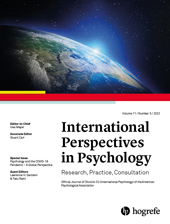Abstract
Abstract. The COVID-19 pandemic has affected all societies worldwide. The heightened levels of stress that accompanied the crisis were also expected to affect parenting in many families. Since it is known that high levels of stress in the parenting domain can lead to a condition that has severe consequences for health and well-being, we examined whether the prevalence of parental burnout in 26 countries (9,923 parents; 75% mothers; mean age 40) increased during COVID-19 compared to few years before the pandemic. In most (but not all) countries, analyses showed a significant increase in the prevalence of parental burnout during the pandemic. The results further revealed that next to governmental measures (e.g., number of days locked down, homeschooling) and factors at the individual and family level (e.g., gender, number of children), parents in less (vs. more) indulgent countries suffered more from parental burnout. The findings suggest that stricter norms regarding their parenting roles and duties in general and during the pandemic in particular might have increased their levels of parental burnout.
Impact and Implications.
The results of this unique international study by the International Investigation of Parental Burnout – which includes Western and non-Western countries across the globe – point to the importance of considering parental burnout as a syndrome helping to meet specific Sustainable Development Goals (SDGs). Of all the potentially modifiable influences affecting individuals’ healthy lives and well-being across the life course (i.e., SDG 3), positive parenting in the early years has the potential to become a common pathway – by fostering social and emotional skills – to promote a range of healthy outcomes in both children and adults. Acknowledging that parenting can be extremely demanding and exhausting for parents who are confronted with specific individual-, family-, and country-level characteristics may give rise to develop programs how to encourage parents to minimize exhaustion in their parenting role and how to adopt nonviolent ways of disciplining children (SDG 16.2). The various individual and cultural factors as well as COVID-19 factors that have been found related to prevalence rates of parental burnout give indications with factors need to be addressed to promote health and well-being of parents and children (SDG 3) and to diminish or prevent violence against children (SDG 16.2).
References
(1990). Parenting stress index manual. Pediatric Psychology Press.
(1969). Fitting autoregressive models for prediction. Annals of the institute of Statistical Mathematics, 21, 243–247. 10.1007/BF02532251
(2015). Are scores on Hofstede's dimensions of national culture stable over time? A Cohort analysis. Global Strategy Journal, 5(3), 223–240. 10.1002/gsj.1098
(Ed.). (2019). Handbook of parenting: Children and parenting (3rd ed., Vol. 1). Routledge. 10.4324/9780429440847
(2020). Treating parental burnout: Impact of two treatment modalities on burnout symptoms, emotions, hair cortisol, and parental neglect and violence. Psychotherapy and Psychosomatics, 89(5), 330–332. 10.1159/000506354
(2021). Families in the COVID-19 pandemic: Parental stress, parent mental health and the occurrence of adverse childhood experiences-results of a representative survey in Germany. European Child & Adolescent Psychiatry, 1, 1–13. 10.1007/s00787-021-01739-0
(2014). Parenting stress. Yale University Press.
(2020). Parental burnout and child maltreatment during the COVID-19 pandemic. Journal of Family Violence, 37(5), 725–731. 10.1007/s10896-020-00172-2
(2018). Indulgence and long term orientation influence prosocial behavior at national level. Frontiers in Psychology, 9, Article 1798. 10.3389/fpsyg.2018.01798
(2021). Variation in government responses to COVID-19 [Version 12.0]. Blavatnik School of Government Working Paper. www.bsg.ox.ac.uk/covidtracker
(2020). Are all burned out parents neglectful and violent? A latent profile analysis. Journal of Child and Family Studies, 30(1), 158–168. 10.1007/s10826-020-01850-x
(2001). Culture’s consequences: Comparing values, behaviors, institutions, and organizations across nations. Sage Publications.
(2011). Compare countries. Hofstede Insights. https://www.hofstede-insights.com/product/compare-countries/
(2013). Values survey module 2013 manual. https://geerthofstede.com/wp-content/uploads/2016/07/Manual-VSM-2013.pdf
(2022). Controlling the uncontrollable: Stress, burnout, and parenting during a pandemic. The Family Journal. Advanced online publication. 10.1177/10664807221079289
(1994). The total workload of male and female white collar workers as related to age, occupational level, and number of children. Scandinavian Journal of Psychology, 35(4), 315–327. 10.1111/j.1467-9450.1994.tb00956.x
(2018a). Consequences of parental burnout: Its specific effect on child neglect and violence. Child Abuse & Neglect, 80, 134–145. 10.1016/j.chiabu.2018.03.025
(2019). Parental burnout: What is it, and why does it matter? Clinical Psychological Science, 7, 1319–1329. 10.1177/2167702619858430
(2020). Is parental burnout distinct from job burnout and depressive symptoms? Clinical Psychological Science, 8(4), 673–689. 10.1177/2167702620917447
(2018b). Exhausted parents: Sociodemographic, child-related, parent-related, parenting and family-functioning correlates of parental burnout. Journal of Child and Family Studies, 27, 602–614. 10.1007/s10826-017-0892-4
(2018). A theoretical and clinical framework for parental burnout: The Balance between risks and resources (BR2). Frontiers in Psychology, 9, Article 886. 10.3389/fpsyg.2018.00886
(2010). Parenting out of control: Anxious parents in uncertain times. New York University Press.
(2018). Quand les circonstances de vie malmènent le quotidien et conduisent au burnout parental. In I. RoskamM. Mikolajczak (Eds.), Le burnout parental: Comprendre, diagnostiquer et prendre en charge. De Boeck Supérieur.
(2020). Families, family policy and the sustainable development goals. UNICEF Office of Research – Innocenti.
(2018). A step forward in the conceptualization and measurement of parental burnout: The parental burnout assessment (PBA). Frontiers in Psychology, 9, 758. 10.3389/fpsyg.2018.00758
. (2021). Parental burnout around the globe: A 42-country study. Affective Science, 2(1), 58–79. 10.1007/s42761-020-00028-4
(2020). Initial challenges of caregiving during COVID-19: Caregiver burden, mental health, and the parent–child relationship. Child Psychiatry & Human Development, 51(5), 671–682. 10.1007/s10578-020-01037-x
(2021). Parental burnout during the COVID‐19 pandemic. Family Process. Advanced online publication. 10.1111/famp.12740
(2020). Parents' stress and children's psychological problems in families facing the COVID-19 outbreak in Italy. Frontiers in Psychology, 11, 1713. 10.3389/fpsyg.2020.01713
(2004). Model-order selection. IEEE Signal Processing Magazine, 21(4), 36–47. 10.1109/MSP.2004.1311138
(2012). Improving national cultural indices using a longitudinal meta-analysis of Hofstede's dimensions. Journal of World Business, 47(3), 329–341. 10.1016/j.jwb.2011.05.001
. (2015). Transforming our world: The 2030 agenda for sustainable development. [A/RES70/L1]. https://sdgs.un.org/2030agenda?msclkid=be37ec45d05011ec8454dddfa7efff63
. (n.d.). COVID-19 government response tracker. https://www.bsg.ox.ac.uk/research/research-projects/coronavirus-government-response-tracker
(2020). Parents' lived experiences with the COVID-19 pandemic. The Family Journal, 29(2), 136–142. 10.1177/1066480720969194



